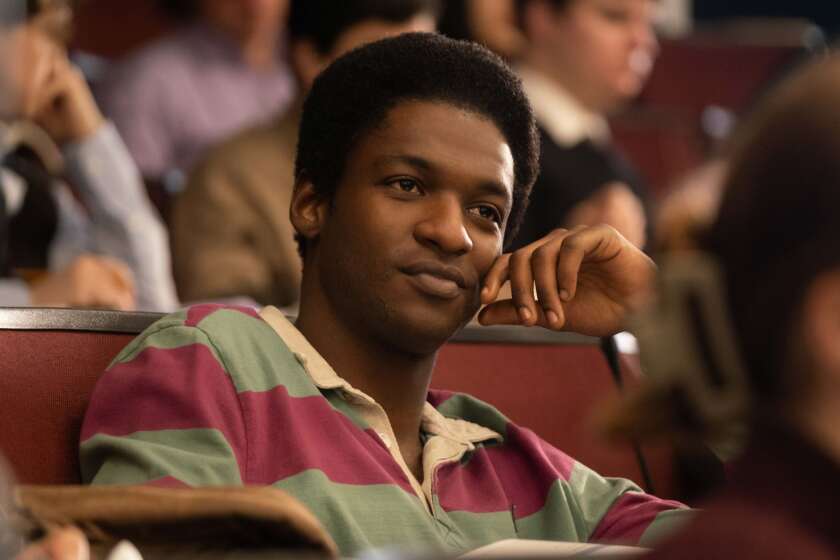MOVIE REVIEWS: EXPLORING THE DARK SIDES : ‘Light of Day’
To many people who grew up after the ‘50’s, perhaps including film maker Paul Schrader, rock ‘n’ roll was not just party music but a form of redemption: an anthem with a jackhammer beat flung against the joylessness of life. The fact that parents often dismissed it as noise or, worse, an incitement to evil, only intensified that feeling. In his newest movie, “Light of Day” (citywide), Schrader tries to catch that contradiction: the idea of the music dancing a knife-edge between two extremes--evil and freedom--with only art’s discipline or love’s passion to separate them.
It’s a heady task, and Schrader doesn’t bring it off. “Light of Day” is a sympathetic, intelligent movie, with one great performance, but it suffers from the malaise rock ‘n’ roll is supposed to cure: inhibitions, a lack of spontaneity. Schrader can’t get our mojo working. His film seems too planned, too refined. And since chains--of family and emotion--are its subject, its inability to snap its own seems crippling.
Schrader’s Joe Rasnick (Michael J. Fox) is factory worker by day, and by night, guitarist with the Barbusters, a band fronted by his sister Patti (Joan Jett). Patti has a videogame existentialist stance, which contradicts Joe’s. He’s steady, dependable, a loving son, a dutiful uncle, loyal to the band. She’s an opportunist with an illegitimate son, her life style an anathema to their intensely religious mother, Jeanette (Gena Rowlands).
The movie takes place in Cleveland, shown as drab, dead-end America, studded with factories, bars and banal tract houses. That’s the clash: Patti’s wild life and amorality, and the more patterned, tortured, moralistic existence of Jeanette. Joe is the swing man between the two, trying to unify them but always failing.
“Light of Day” is both family drama and rock vehicle. (It was originally offered to Bruce Springsteen, who borrowed Schrader’s first title, “Born in the U.S.A.,” for his recent album, then repaid him by penning a new title number here.) But the two parts never really jell. Schrader and his cameraman, John Bailey, used daring stylizations and visual motifs in “Cat People” and “Mishima.” Here, he returns to the plan of “Blue Collar”: simple, clear setups and camera movements. And, though this works in the family scenes, in the musical numbers, you want more buoyancy, more lift.
Schrader schematizes everything. Good: bar bands, new wave music, family loyalty. Bad: Top 40, heavy metal, hypocritical preachers. Occasionally, he gets off a glib little eschatological joke. A band that used to be called the Sins has changed its name; now it’s only the Problems.
One problem, or sin, Schrader doesn’t reveal--something that seems a plausible part of bar-band or heavy-metal scenes--is drug abuse. And with no drugs, and little sex, to demonstrate Patti’s darker side in this PG-13 movie--Schrader, instead, makes her a thief, stealing steaks from a supermarket. The latter drives Joe into a frenzy; he throws the meat in the air, screams, breaks up a whole tour. But is he really this incensed by shoplifting (albeit with a child involved)? Or is he reacting to something scrubbed out of the script: Patti’s probable drug abuse and promiscuity in front of her 4-year-old child? You suspect the latter: A scene with Jeannette, injected with painkillers in the hospital, looks like a conscious rhyme for an earlier, deleted, scene with Patti.
We seem to be getting an absurdity: a cautionary story with the sins disguised, for propriety’s sake. (There is one shot, in a backstage dressing area, of two blitzed-looking musicians gazing stuporously up from a couch. But, for all we know, they’re nodding off from the exhilaration of stealing chopped liver.)
As Patti, Joan Jett is a gutsy presence. She gives the part perverse pride, a sensitive core: a mean girl in black leather and jeans with hard eyes and a rough code. (Her line readings, though, often seem clipped or monotonous.) As Joe, Michael J. Fox stretches himself heroically, subverting his usual cute-kid persona, and even playing his own guitar riffs--and co-writing one song.
But this can’t disguise the fact that, though Fox’s presence obviously got the movie made, he seems wrong for the part: Joe is lightweight morally and musically. Fox doesn’t show the feistiness or calculated goofiness a guy his size and temperament would have to cultivate to survive in this milieu, and his rage and sadness lack conviction. The fact that he seems so unformed--which enables him to play teen-agers believably--works against him here.
It’s Gena Rowlands who supplies most of the spontaneity. She gives her scenes fire and force, resonant humanity. Rowlands gets her great scene here--one so powerful and stunning it almost redeems the entire movie--from the kind of situation you’d think would make you groan: the mother’s deathbed blessing to her errant daughter.
Watching her here seems a brief glimpse into the heart of acting: the objectivity and naked passion she generates, the mother struggling to hold on to her pre-planned speech, losing the thread, eyes blanking out, picking up from the beginning without any recognition, and then going on firmly, determinedly--with a held-back desperation, and the almost wan formality of the suitor pressing a last possible chance, asserting one last moment of dignity or connection. You can’t describe what happens as a tear-jerker: Rowlands suddenly makes the movie explode with the emotion and grace Schrader was reaching for all along.
‘LIGHT OF DAY’ A Tri-Star release of a Taft Entertainment/Keith Barish presentation. Producers Rob Cohen, Keith Barish. Director Paul Schrader. Script Schrader. Camera John Bailey. Editor Jacqueline Cambas. Music Thomas Newman. Production design Jeannine Claudia Oppewall. Executive producer Doug Claybourne. With Michael J. Fox, Gena Rowlands, Joan Jett, Michael Mckean, Thomas G. Waites.
Running time: 1 hour, 47 minutes.
MPAA rating: PG-13 (parents are strongly cautioned; some material may be inappropriate for children under 13).
More to Read
Only good movies
Get the Indie Focus newsletter, Mark Olsen's weekly guide to the world of cinema.
You may occasionally receive promotional content from the Los Angeles Times.










